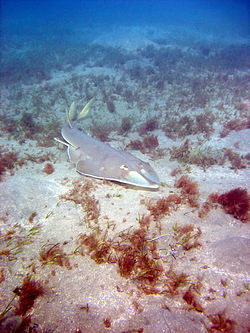| Halavi guitarfish | |
|---|---|
 | |
| Scientific classification | |
| Kingdom: | Animalia |
| Phylum: | Chordata |
| Class: | Chondrichthyes |
| Subclass: | Elasmobranchii |
| Order: | Rhinopristiformes |
| Family: | Glaucostegidae |
| Genus: | Glaucostegus |
| Species: | G. halavi |
| Binomial name | |
| Glaucostegus halavi (Forsskål, 1775) | |
| Synonyms | |
| |
The halavi guitarfish (Glaucostegus halavi) [1] is a part of the Glaucostegidae family. It is a species of ray found in the Indo-West Pacific (Red Sea to Gulf of Oman, with unconfirmed records in the area east of Oman). [3] Recorded twice, in 1997 and 2004, in the levantine waters, the question of its permanent settlement in the Mediterranean Sea remains open. [4] Its name is derived from the Arabic word حلاوي (halawi). [5]
They are usually large with a short, wide snout with a rounded tip. Typically they are a yellow/gray color, which can help them blend in on the sea floor. Averagely, they are born at around 29cm, but can grow to be 171 cm. [6]
It feeds on small molluscs and bony fishes. [3]
